How to prevent stress in dogs
How do you spot negative stress?
As human beings we know that not all stress is negative or has an unpleasant reason behind it. It’s the same for our furry friends, dogs also experience positive stress. It's known as "eustress" (as the opposite of "distress") and may happen, for example, when a dog is very happy to see someone, when it's being fed, or when it's excited to go for a walk, or when it's playing with a favourite toy.
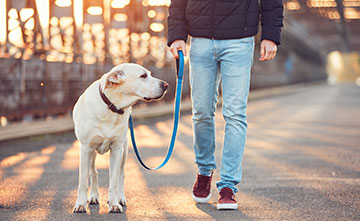 There is also positive stress in dogs.
There is also positive stress in dogs.
- Restlessness
- Panting
- Wide open eyes
- Tail tucked under
- Trembling
- Avoidance
- Aggression
- Baring teeth
- Flight or freeze behaviour
- Toileting accidents
- Sweaty paws
- Raised hackles
- Increased shedding and/or dull coat
How can you help your dog feel less stressed?
 Sometimes the cause of stress is not directly visible.
Sometimes the cause of stress is not directly visible.
How can you calm a dog?
The key to calming a nervous dog is providing a safe environment. For some dogs, physical contact with their owner can also have a calming effect and reduce stress. This is a matter of personal preference and should be decided by the dog's owner or, if necessary, with the help of a professional.
Depending on the stress level, it may help the dog to be able to leave the situation. If the dog needs to stay in the situation for training purposes, for example, and their stress level isn't too high yet, a food tube with high value wet food may help. If the dog isn't too stressed to eat, this can have a calming effect.
As well as a safe environment, the owner should convey a sense of security. Combined with a calm voice, this can help the dog to relax.
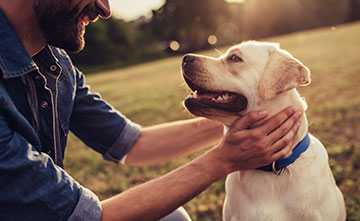 In times of stress, it is important for the dog to be able to trust its owner.
In times of stress, it is important for the dog to be able to trust its owner.
Some dogs benefit from being able to run around after a stressful situation to release some of their tension. You should, however, be absolutely sure that the situation has passed and won't happen again straight away. That could have serious consequences and your dog could bolt out of fear or stress and run away.
Bringing a confident second dog into the situation can also help a stressed and agitated dog. This should only be done under professional supervision unless you are absolutely certain that the other dog is not a threat in any way, which could cause additional stress.
Lick mats or food games are also a popular way to distract dogs before stressful situations arise, for example before the owner leaves the house. Over a longer period of training (several weeks or months), small treats with natural additives can help support the dog when it is anxious, nervous or stressed. This is a natural way to encourage the dog to relax. These snacks aren't a substitute for training, of course, but they can be included in the dog's daily training routine to provide valuable natural supplements as well as a tasty treat.
What causes stress or fear in dogs?
- Illness
- Pain
- Overstimulation
- Overwhelm or boredom
- Other dogs
- Unstable environment (e.g. in a shelter or a boarding kennel).
- Changes at home (e.g. an addition to the family, a new pet, a house move, the death of a family member or pet, etc.).
Product recommendations
The benefits of PLATINUM dog food
- PLATINUM uses a unique preparation method called FSG, which offers numerous advantages compared to conventional dog food.
- Dog food prepared with FSG is gently cooked only in its own meat juice and is therefore nutrient-rich like BARF, excellent for building muscles and also extra tasty for your dog.
- With at least 70% fresh meat in the dry dog food and 83% fresh meat or fresh fish in the wet dog food, PLATINUM places great value on a composition of the food that is adapted to the needs of dogs.
- The declaration and composition of dog food prepared with FSG is tested regularly and independently by ELAB Analytik GmbH (formerly TÜV SÜD ELAB) - for canine health protection.
- PLATINUM is generally very well accepted by dogs of all breeds and ages. Even four-legged friends with sensitive digestion or intolerances usually tolerate PLATINUM dog food well.
- All products are free of soya, GMOs and gluten. In addition, no flavour enhancers, attractants, odourants or colourings are used.
- Over 2,000 positive customer reviews at Trusted Shops speak for themselves!



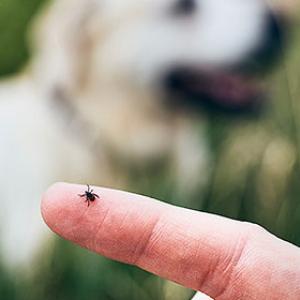


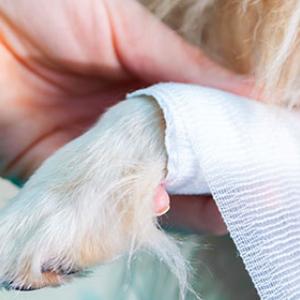


.png)
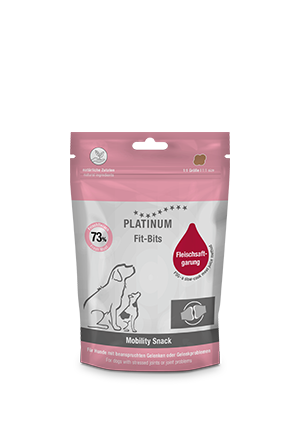
.png)
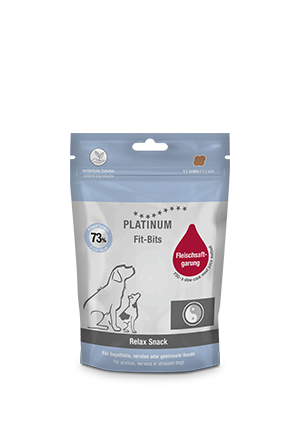
.png)